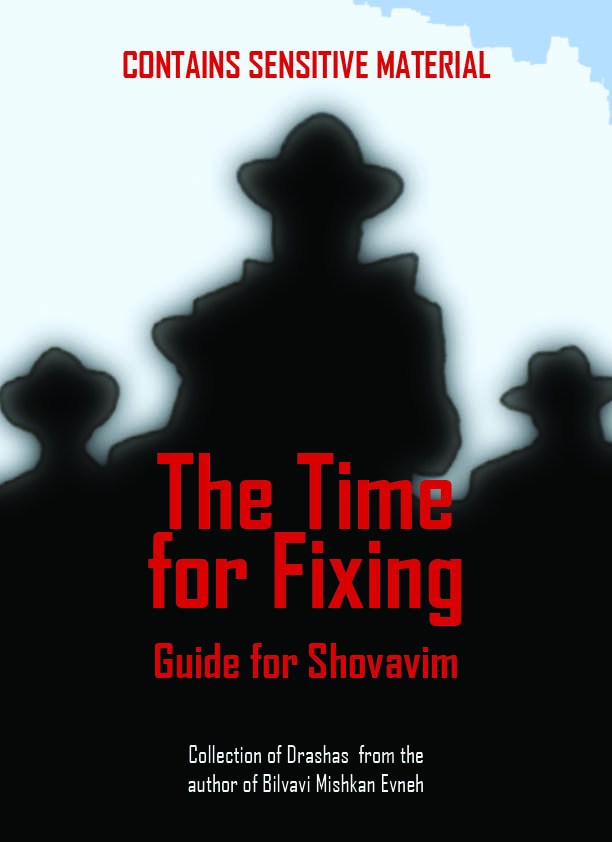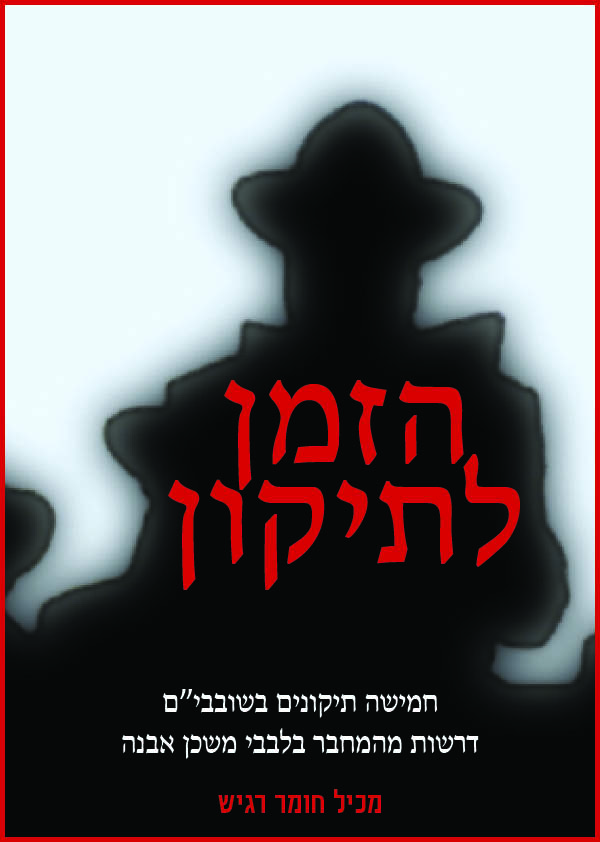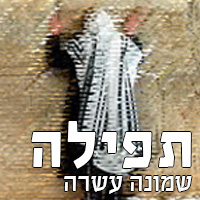- להאזנה תפילה 101 מינים כופרים
101 Living From Our Emunah
- להאזנה תפילה 101 מינים כופרים
Tefillah - 101 Living From Our Emunah
- 7483 reads
- Printer-friendly version
- שלח דף במייל
Those Who Don’t Believe
We daven in Shemoneh Esrei, וכל המינים כרגע תאבדו – that those who deny Hashem should be destroyed. Someone who denies Hashem (a “min”) is liable to the death penalty, and in the times of the Gemara, he would be put to death. On a deeper note, though, someone who denies Hashem is already considered to be dead, because he lives a deathlike kind of existence.
Our whole life-sustaining energy, our chiyus, comes from having emunah; as it is written, “And the righteous man shall live by his faith.” We need emunah in order to live. Someone who doesn’t believe in Hashem not only forfeits his emunah – he has basically forfeited his life. Since he has cut himself off from having emunah, he has cut himself off from his Source of life. So his death penalty is not a punishment – it is rather a direct result of not having emunah.
A person who doesn’t believe in Hashem, at his worst level, is called a min or a kofer, a complete denier of Hashem. Most of us, however, who keep Torah and mitzvos, do not ever sink to such a level as to outright deny Hashem. But, deep down, even those who keep Torah and mitzvos struggle with their emunah.
Chazal say that Noach was someone who “believed, yet didn’t believe.” He believed in Hashem, but he was somewhat weak in his emunah. This can be applied as well to most of us who keep Torah and mitzvos.
We believe in Hashem, of course; in our minds, we all believe in Him. But often, the knowledge about Hashem in our minds has not yet been internalized in our heart. “And you shall know today, and you shall return the matter to your heart.” The emunah that we know in our mind must become internalized in our heart.
The Ramban says that there are two levels of belief – Emunah (faith) and Bitachon (reliance). Emunah is what we know of Hashem in our minds, and Bitachon is when we internalize it in our heart and we actualize our Emunah.
If a person does not seek to constantly work on his emunah each day of his life, if he does not try to instill emunah in his heart, then his emunah will be weak. He will be someone who “believes, yet doesn’t believe.” This is in spite of the fact that he grew up on the knees of Torah and mitzvos. He might know in his mind about Hashem, but he does not necessarily feel that way in his heart….
The Contradiction Inside Us
If a person really thinks about it deeply, he can discover that there is actually a tremendous contradiction going on between his brain and heart.
For example, a person might know, intellectually, that Hashem is the Provider of the world, yet he still worries about how he will have what to eat tomorrow. Chazal say that such a person is of those who are weak in their emunah.
A person knows, intellectually, that everything is from Hashem, yet he still can have an angry outburst. Chazal say that an angry person is like someone who commits idol worship; what is the connection? It is because someone who gets angry has temporary lost his belief in Hashem, which is the same idea as idol worship, in which a person loses belief in Hashem. No one will become angry directly with Hashem, chas v’shalom; usually, when a person gets angry, he doesn’t get angry with Hashem. But he doesn’t attribute how everything comes from Hashem. In that sense, it is as if he is committing idol worship.
If a person doesn’t seek to work on his emunah day by day, by default he will naturally encounter contradictions between his mind’s knowledge with what he feels in his heart. He won’t feel in his heart the emunah that he knows of in his mind. A person must make a self-introspection and become aware of this contradiction going on inside himself. He must realize that although he knows in his mind that Hashem runs the world, his heart doesn’t feel that way yet. He does not yet feel his emunah; it hasn’t yet been internalized.
Of course, we are all maaminim (believers), but often it’s only in our brains, and we don’t feel emunah in our hearts. The Steipler zt”l said that there are many levels to emunah; there are rooms within rooms to emunah.
The first commandment was, “I am Hashem your G-d.” This commandment was the root of everything; Rav Saadya Gaon says that it contained the entire Torah. It is because emunah in Hashem is where we get our vitality in life from. If a person lives from his emunah, he lives the level that we were at Har Sinai. He is connected to the level of being at Har Sinai. The Torah that he learns is the kind of Torah that we received at Har Sinai, a Torah connected with emunah. But if a person doesn’t have emunah, even if he always learns Torah, his Torah learning isn’t connected with the level of being at Har Sinai.
If a person never reflects, then it’s very possible that all of his “emunah” is only intellectual. He might even think that emunah is just one of the 613 mitzvos, and he doesn’t realize how central emunah is to our life. He views “emunah” as just another fact of life, and he is unaware that emunah is the very root of our life-sustaining energy.
We need to work every single day on our emunah! Emunah cannot just be another random piece of information to us. It is not a side thing. It’s the root of everything!
We know that the greatest mitzvah is learning Torah. But does that mean that Emunah is not as important? Torah is greater than all the mitzvos, but Emunah is the root of the Torah!! Without Emunah we do not really have Torah. The Torah that we learn must be connected to Har Sinai, in which we had revealed emunah. Chazal say that if someone says that Torah is not from heaven, he is a denier of Hashem, in spite of the fact that he learns Torah. Because learning Torah isn’t enough. It must be preceded with emunah.
Working On This Practically
It must be very clear to you that emunah is the very root of all life-sustaining energy. We must each take notice of the contradictions between our brain and heart and see that our heart still doesn’t feel the emunah that we know of in our brains. And we must seek to instill emunah in our heart.
First, clarify to yourself that emunah in Hashem is the reality of our life, that it is the root which sustains us.
After that, notice the contradictions going on between your brain and heart. Think into all the situations of your life in which you don’t yet feel emunah in your heart.
For example, if you get angry, it should bother you that you haven’t yet internalized emunah in your heart. It should bother you that although you know in your mind that you need to have emunah, your heart still doesn’t feel emunah, and that is why you were able to get angry. But do this in a constructive way: now that you feel bad about it, this can spur you on to improve yourself to work on bringing emunah into your heart.
You need to work on how your emunah can be felt in your heart. The emunah which you should seek is not a brainy, “intellectual” thing, and it is not “inspirational”. It is not an “emotional” thing either. Rather, it is what you internalize in your heart. When you internalize your mind’s emunah into your heart, your actions will then reflect what you have internalized.
Where We Get Our Energy From
There is another point now which we will discuss, and it a point that is even more hidden than what was discussed until now.
Ever since Hashem breathed a spirit of life into man, it has been the nature of man to seek vitality (chiyus). Every person has a will to feel alive. All people want to be alive and to feel alive, and in that aspect, we all share a common denominator. But the difference between one person and another is in how alive a person is, as well as from where he is getting his vitality in life from. Any person who seeks truth should become aware of this concept.
We each have to reflect on where we are getting our chiyus from. Understandably, we also have to reflect on how much we are keeping the mitzvos and to make a necessary cheshbon hanefesh (self-accounting), but such reflection is still only addressing the outer aspects of our life, our chitzoniyus (external layer). The inner kind or reflection we need to make is on our penimiyus (inner layer): “From where am I getting my chiyus from?”
A person who hears about this might respond, “What kind of question is this? Of course I have chiyus. I learn Torah, I daven, and I do all the mitzvos. That is where we get our chiyus from.” But if a person really thinks about it, he can discover from what he truly derives his chiyus from in life…
Everyone is getting their chiyus from something. Some people are getting their chiyus from their cup of coffee in the morning! Others get their chiyus from a compliment they received from someone that day, or from hearing a “Good Morning”. Others get their chiyus from a good meal they enjoyed that day; or from a fiction novel they are reading; or from a nice picture they looked at that day which was pleasing to the eye.
People get their chiyus from these things! But this is not true chiyus! Most people do not have a real chiyus in their life. They get their chiyus from various kinds of superficial pleasures. There are others who do seek chiyus, but they seek it with pursuing physical gratification or with running after honor. This is also a superficial kind of chiyus.
If a person is a bit more spiritual, he gets chiyus from his davening. This is wonderful, but it’s not enough. If a person is even more spiritual, he gets chiyus from learning, and if he is even more spiritual, he gets chiyus from learning for many hours on end. Maybe he gets his chiyus from a penetrating insight that came into his head when he learned in his morning seder. All of these things are wonderful, but they are not yet true chiyus!
We must derive chiyus from keeping the mitzvos, because it is Hashem’s will that we do the mitzvos. And we must derive chiyus as well from learning Torah, because it is Hashem’s Torah. But even if we get chiyus from mitzvos and Torah learning, there is a more inner source of chiyus which we need. We need to mainly get chiyus from our very emunah in Hashem.
| We need to mainly get chiyus from our very emunah in Hashem. |
“And the righteous man shall live by his faith.”
We can get chiyus from the very fact that there exists a Master of the world. It is very possible that a person lived his whole life and he had emunah, but he didn’t get chiyus from his emunah! Even if he believed in his mind about Hashem’s existence, and even if he enabled that knowledge to penetrate into his heart, it is still possible that he doesn’t derive chiyus from his emunah.
A person should therefore ask himself: “What makes me feel more alive? If I feel good from eating a certain kind of food I enjoy, or from a nice compliment I receive, or from a song I enjoy listening to, why don’t I feel chiyus just from hearing the mention of Hashem?” It is written, “To Your Name and to Your remembrance, my soul desires.” Knowing that Hashem exists is not just a piece of knowledge; it is the source of all our energy!
This is what it all boils down to: if someone derives chiyus from knowing about Hashem.
Many people seek spirituality, and there are others who take their spirituality further and they seek to derive chiyus from Torah and mitzvos. This is a true kind of search, but, it’s very possible that a person is very “spiritual”, yet he is missing the main source of chiyus to have in life. A person needs to get chiyus from his emunah - from just knowing that there is a Master of the world.
A person might even be getting his chiyus from learning Torah, but he doesn’t necessarily get chiyus from knowing that there is a Master of the World. This is the meaning of the prophecy, “[Even] those who hold onto Torah do not know Me.”
The real way that our life is supposed to look like is, that when a person gets up in the morning, he gets chiyus from saying Modeh Ani; not just to “know” that there is a Master of the world, but as a knowledge that he can feel and sense. It is a knowledge that gives us pleasure. It is not just an abstract kind of knowledge that a person knows about from learning sefer Daas Tevunos of the Ramchal; it is a kind of knowledge that can be very pleasurable to us, and it must become the source of where we get our chiyus from.
NOTE: Final english versions are only found in the Rav's printed seforim »















